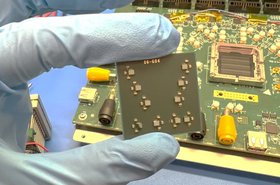The Department of Commerce is hoping it will be able to plug a $3 billion hole in its CHIPS and Science Act budget through the passing of the Spectrum and National Security Act.
Under the terms of the legislation, which is currently at its second reading in the US Senate, money made through the sale of licenses in the 12.7 to 13.25GHz frequency bands by the Federal Communications Commission (FFC) can be used to fund government tech programs.
The budget shortfall arose after Intel was contracted by the government to build advanced chips for military and intelligence purposes, with the total $3.5bn bill originally slated to be split between the Department of Commerce and the Department of Defense.
However, after the Defense Department backtracked on its $2.5bn funding pledge for the project, the Department of Commerce was left to foot the entire bill. If the Spectrum and National Security Act is to become law, it would cover the entire shortfall and add an extra $5 billion for research and development covered by the CHIPS Act.
First proposed by Ted Cruz and John Thune in March 2024, the Act will restore the FCC’s authority to auction off 1,250MHz of licensed spectrum for mobile broadband services. The FCC lost its spectrum authority on March 9, 2023, after the US Senate allowed it to lapse for the first time ever, meaning the agency had been unable to auction more spectrum for 5G networks.
The $280bn CHIPS and Science Act was approved by Congress in July 2022, with $52bn of the overall funding package designated as subsidies for US semiconductor manufacturers. Funding from the Act has also been earmarked for semiconductor R&D, growing a skilled semiconductor workforce, and incentives for the manufacturing of semiconductors and specialized tooling equipment.
In March 2024, it was announced that Intel would receive $8.5 billion in direct funding, $11bn in low-interest rate loans, and a 25 percent investment tax credit on up to $100 billion of Intel’s capital investments under the Act. It will be used to support the company’s investments in Arizona, New Mexico, Ohio, and Oregon, where the company is expanding its chipmaking facilities.
However, speaking at an Intel Foundry event before that funding announcement was raised, US Secretary of Commerce, Gina Raimondo, called for a second iteration of the CHIPS and Science Act, arguing that significant additional funding for the US semiconductor industry would be necessary if the country wanted to “lead the world.”
Speaking at the time, Raimondo said: “To be clear, we can't and do not want to make everything in America… That isn't a reasonable goal. But we do need to diversify our semiconductor supply chains and have much more manufacturing in the United States, particularly leading-edge chips, which will be essential for AI."







